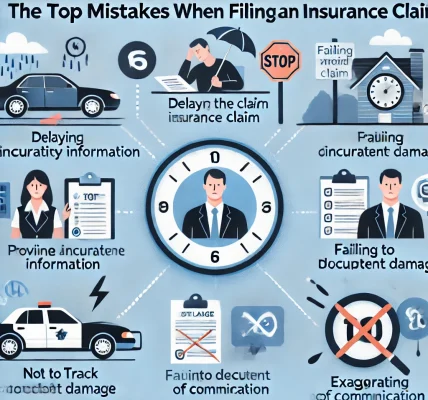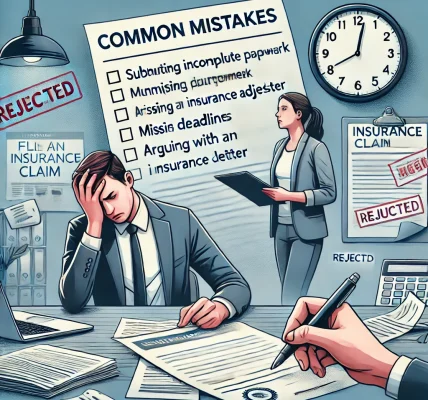Filing an insurance claim can be a stressful process, especially when you’re unsure if you will receive the full amount you’re entitled to. Many policyholders end up accepting lower payouts simply because they don’t understand the process or make mistakes along the way. This guide will provide insider tips on how to maximize your insurance payout while staying within legal boundaries.
Understanding How Insurance Payouts Work
Before filing a claim, it’s important to understand how insurance companies evaluate claims. Most insurers assess the following factors:
- Policy Coverage – What is covered and what is excluded in your policy?
- Deductibles & Limits – How much will be deducted from your payout based on your policy terms?
- Proof of Loss – The quality of documentation and evidence you provide.
- Insurance Adjuster’s Report – The adjuster assesses the damage and determines the settlement amount.
- Claim History & Filing Accuracy – Previous claims and errors in your submission can impact the amount approved.
By proactively addressing these areas, you can increase the likelihood of receiving a fair and higher payout.
Step-by-Step Guide to Maximizing Your Insurance Payout
1. Know Your Policy Inside Out
One of the biggest mistakes policyholders make is not fully understanding their coverage. Before filing a claim, take time to:
✅ Read the fine print – Understand coverage limits, deductibles, and exclusions.
✅ Check for additional coverage – Some policies offer add-ons like temporary living expenses, rental car reimbursement, or extended liability coverage.
✅ Ask questions – If you’re unsure about something, consult your insurance agent for clarity.
2. Act Fast & Report Your Claim Immediately
Time is crucial when filing an insurance claim. Delaying the claim process can lead to complications and even denial.
✅ Report the incident as soon as possible – Most insurers have time limits for filing claims.
✅ Avoid unnecessary delays – Promptly submitting required documents can speed up processing and reduce payout reductions due to delays.
3. Document Everything with Clear Evidence
Insurance companies require proof of loss before approving claims. A lack of documentation can result in a lower payout.
✅ Take detailed photos and videos – Capture the damage from multiple angles.
✅ Keep all receipts and invoices – If you incur expenses (such as temporary repairs), save all receipts as proof.
✅ Obtain official reports – If applicable, get police reports, medical records, or incident reports to strengthen your claim.
✅ Maintain a claim file – Organize all documents, including emails and letters from your insurer, for easy reference.
4. Avoid Low Initial Settlement Offers
Insurance companies often offer a low initial settlement in hopes that policyholders will accept without negotiation.
✅ Don’t accept the first offer immediately – Take time to review the settlement and compare it with your estimated damages.
✅ Politely negotiate – If the amount seems unfair, request a detailed breakdown of how they calculated the payout.
✅ Provide additional supporting evidence – If you believe the estimate is too low, submit additional photos, invoices, and expert opinions.
5. Get a Second Opinion from Independent Experts
Insurance adjusters work for the insurance company, which means their assessment may not always be in your best interest.
✅ Hire a public adjuster – If your claim is significant, a public adjuster can assess the damage independently and negotiate a higher settlement on your behalf.
✅ Consult professionals – Contractors, mechanics, or medical experts can provide independent evaluations to support your claim.
✅ Compare estimates – If your insurer’s estimate is significantly lower than an expert’s, use that as leverage to negotiate a better payout.
6. Be Honest & Avoid Exaggerating the Claim
While it’s important to maximize your payout, exaggerating losses or providing false information can lead to claim denial or even legal trouble.
✅ Provide accurate information – Stick to the facts and ensure your documentation is truthful.
✅ Do not inflate repair costs – If the insurer discovers discrepancies, it can delay or deny your claim.
✅ Follow policy guidelines – Ensure all claims align with your coverage to avoid disputes.
7. Communicate Effectively & Follow Up Regularly
Many claims get delayed simply because policyholders fail to follow up.
✅ Stay in regular contact – Check in with your insurer to ensure your claim is being processed.
✅ Respond promptly to requests – If your insurer asks for additional documents, submit them as soon as possible.
✅ Keep written records of conversations – Document phone calls and emails for reference in case of disputes.
8. Appeal a Denied or Underpaid Claim
If your claim is denied or the payout is lower than expected, you have the right to challenge it.
✅ Request a written explanation – Ask the insurer for a detailed reason for the denial or reduced payout.
✅ Provide additional evidence – If possible, submit more proof to support your claim.
✅ Escalate the claim – If needed, escalate your claim to a supervisor or an independent arbitrator.
✅ Seek legal advice if necessary – In rare cases where disputes persist, consulting an attorney specializing in insurance claims may be beneficial.
Final Tips for a Successful Claim
- Stay organized – Maintain a file with all claim-related documents.
- Be proactive – Follow up regularly and ensure all paperwork is complete.
- Know your rights – Understand what your policy covers and seek clarification when needed.
- Be patient but persistent – Some claims take time, but regular communication can speed up the process.
Conclusion
Maximizing your insurance payout requires a strategic approach, attention to detail, and effective communication with your insurer. By understanding your policy, documenting everything, negotiating confidently, and avoiding common mistakes, you can ensure you receive the fair compensation you deserve.



